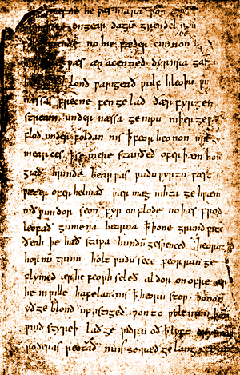Beowulf (/ˈbeɪ.ɵwʊlf/; in Old English [ˈbeːo̯wʊlf] or [ˈbeːəwʊlf]) is the conventional title of an Old English heroic epic poem consisting of 3182alliterative long lines, set in Scandinavia, commonly cited as one of the most important works of Anglo-Saxon literature.
It survives in a single manuscript known as the Nowell Codex. Its composition by an anonymous Anglo-Saxon poet[a] is dated between the 8th and the early 11th century.[5][page needed] In 1731, the manuscript was badly damaged by a fire that swept through a building housing a collection of Medieval manuscripts assembled by Sir Robert Bruce Cotton. The poem's existence for its first seven centuries or so made no impression on writers and scholars, and besides a brief mention in a 1705 catalogue by Humfrey Wanley it was not studied until the end of the eighteenth century, and not published in its entirety until the 1815 edition prepared by the Icelandic-Danish scholar Grímur Jónsson Thorkelin.
In the poem, Beowulf, a hero of the Geats in Scandinavia, comes to the help ofHroðgar, the king of the Danes, whose mead hall (in Heorot) has been under attack by a monster known as Grendel. After Beowulf slays him, Grendel's mother attacks the hall and is then also defeated. Victorious, Beowulf goes home to Geatland in Sweden and later becomes king of the Geats. After a period of fifty years has passed, Beowulf defeats a dragon, but is fatally wounded in the battle. After his death, his attendants bury him in a tumulus, a burial mound, in Geatland.
Beowulf , written in Old English sometime before the tenth century A.D., describes the adventures of a great Scandinavian warrior of the sixth century.
A rich fabric of fact and fancy, Beowulf is the oldest surviving epic in British literature.
Beowulf exists in only one manuscript. This copy survived both the wholesale destruction of religious artifacts during the dissolution of the monasteries by Henry VIII and a disastrous fire which destroyed the library of Sir Robert Bruce Cotton (1571-1631).
The poem still bears the scars of the fire, visible at the upper left corner of the photograph. The Beowulf manuscript is now housed in the British Library, London.

The first page of the Beowulf manuscript.
More News Here
Breaking News
World News
Science News
Tech News
Video Games
WakeUp
Health News
Weather
Android
Nature
Paranormal News
UFO News
Games
LIKE US ON FACEBOOK
News Just For You on Facebook
Cyber Network News on Facebook
Quantum Science News on Facebook
Awake News on Facebook
Paranormal News on Facebook
UFO News on Facebook
Neural Network on Facebook
Follow Us on Twitter
Advertise with us
Try our Search
.jpg)
0 comments:
Post a Comment